Unit 4 Topic 2 Would you like to cook with us? Section D 2023-2024学年七年级英语上册 课件(仁爱版)(共27张PPT)
文档属性
| 名称 | Unit 4 Topic 2 Would you like to cook with us? Section D 2023-2024学年七年级英语上册 课件(仁爱版)(共27张PPT) |
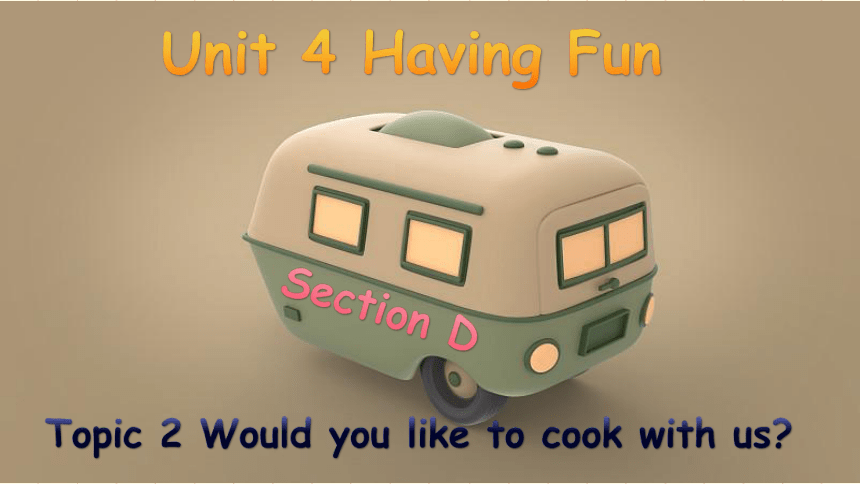
|
|
| 格式 | pptx | ||
| 文件大小 | 30.0MB | ||
| 资源类型 | 教案 | ||
| 版本资源 | 仁爱科普版 | ||
| 科目 | 英语 | ||
| 更新时间 | 2023-12-19 00:00:00 | ||
图片预览

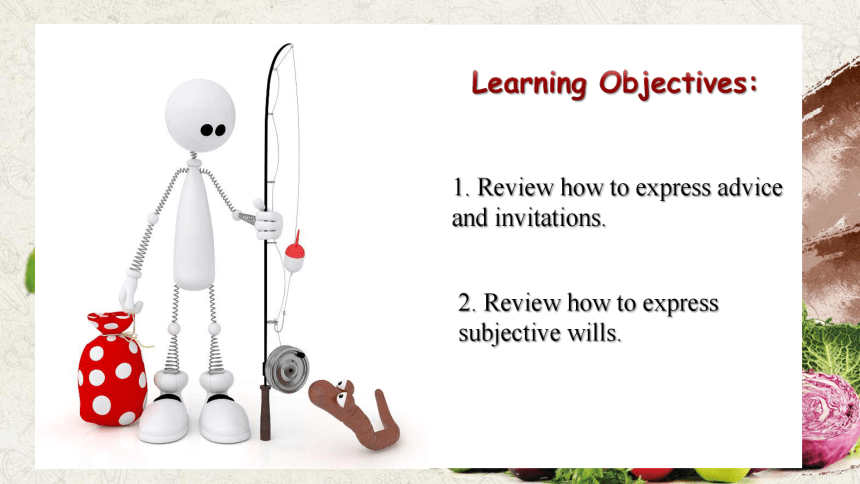
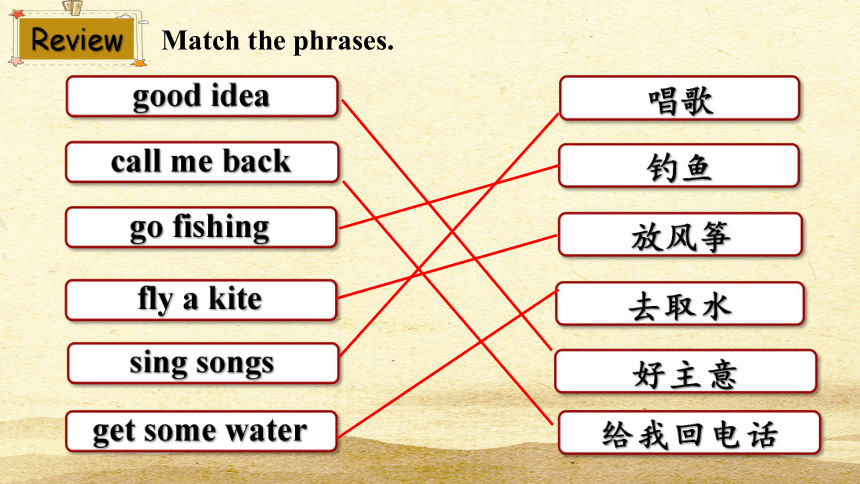
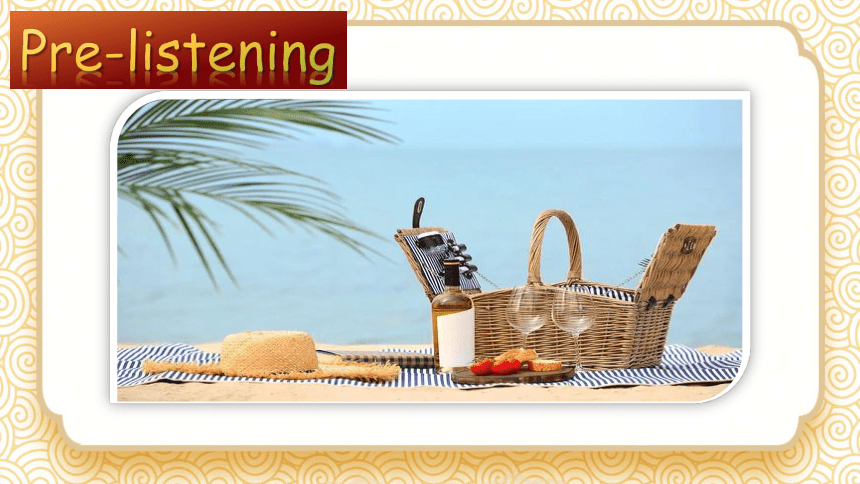
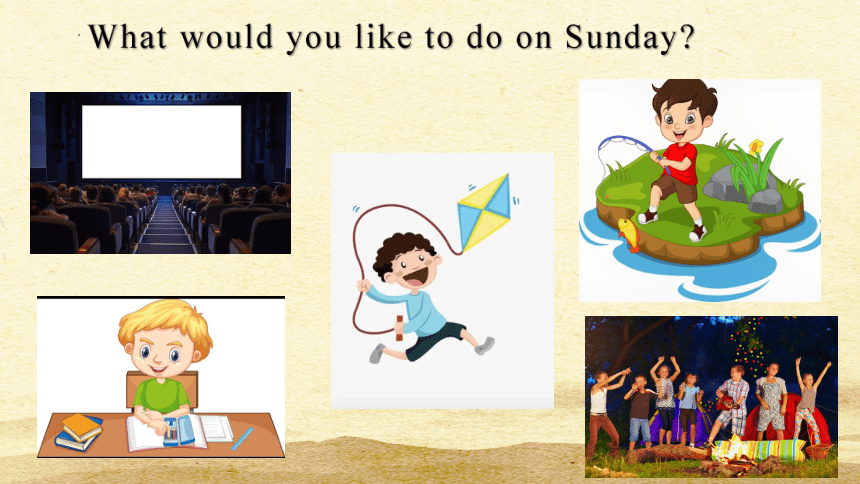
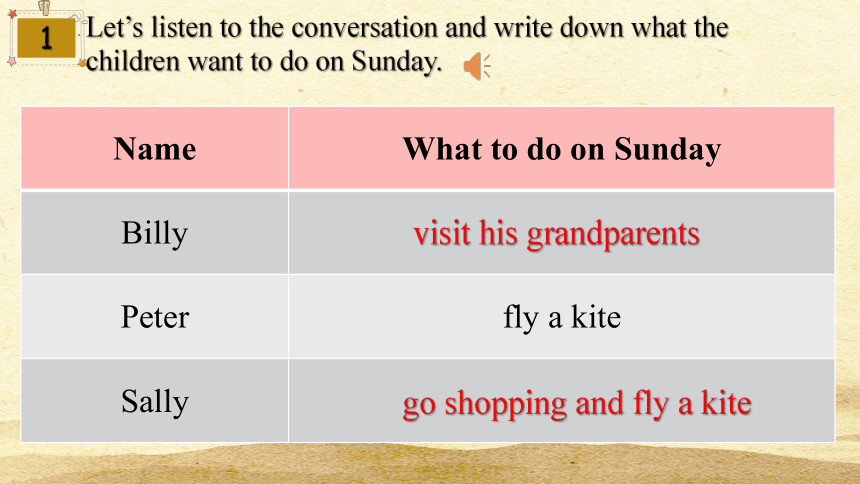
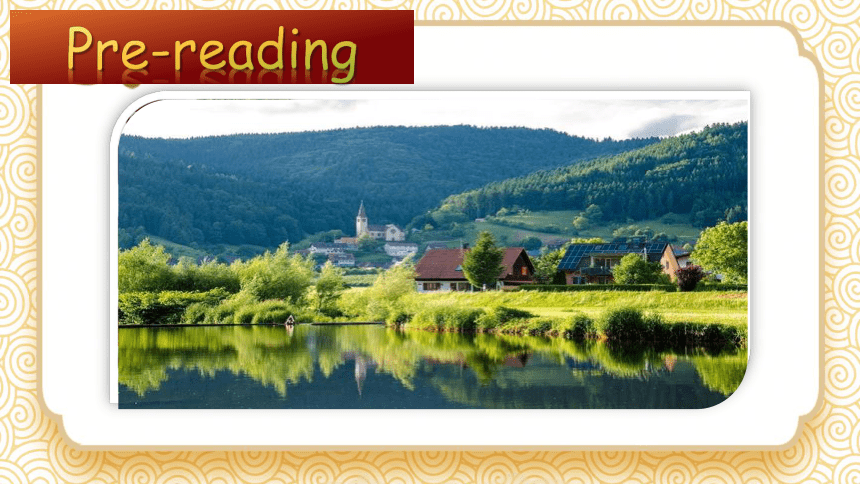
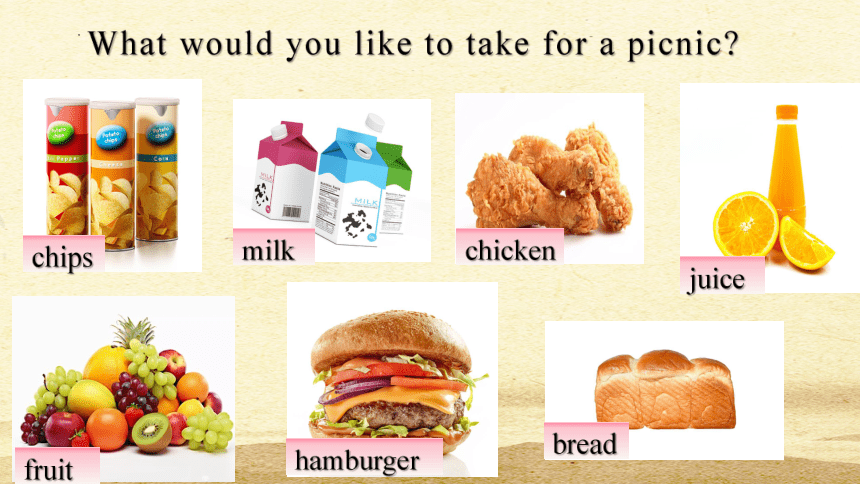
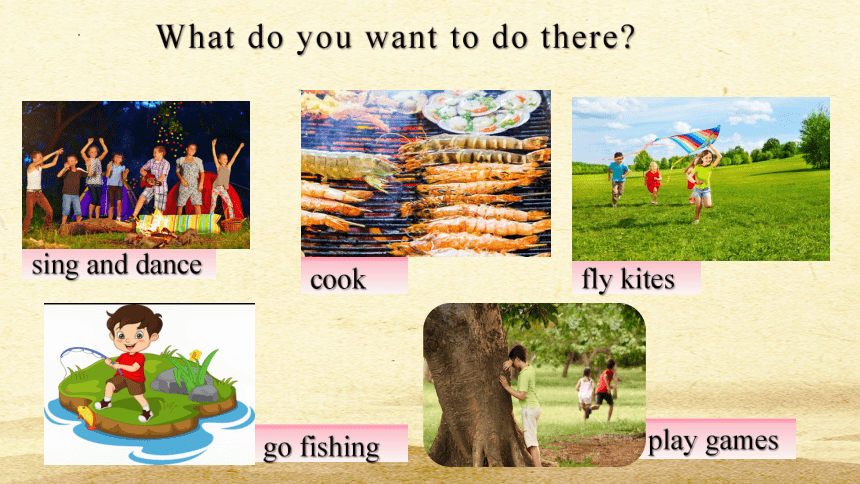
文档简介
(共27张PPT)
Unit 4 Having Fun
Topic 2 Would you like to cook with us
Section D
Learning Objectives:
1. Review how to express advice and invitations.
2. Review how to express subjective wills.
Review
Match the phrases.
good idea
唱歌
call me back
钓鱼
go fishing
放风筝
去取水
好主意
给我回电话
fly a kite
sing songs
get some water
Pre-listening
What would you like to do on Sunday
Let’s listen to the conversation and write down what the children want to do on Sunday.
1
Name What to do on Sunday
Billy
Peter fly a kite
Sally
visit his grandparents
go shopping and fly a kite
Pre-reading
What would you like to take for a picnic
chips
milk
chicken
juice
fruit
hamburger
bread
What do you want to do there
sing and dance
cook
fly kites
go fishing
play games
What food does Kangkang’s family take for their picnic
Can you guess Circle them on your book.
2b
Read 2a and answer the following quesions.
While-reading
Who likes bananas very much
2. What does Kangkang like eating
3. What does Kangkang’s mother cook
4. Is Dingding Kangkang’s brother
Kangkang’s mother (likes bananas very much).
He likes hamburgers, orange juice and fish.
She cooks fish and eggs.
No, it isn’t. It’s Kangkang’s dog.
Read 2a again and complete the passage.
2a
Kangkang’s family often go out for ________ on _________. They take some apples, bananas, ___________ and eggs _______ them. They take drinks ______ milk and orange juice. His father likes ________ apples. _________ are his mother’s favorite. Kangkang _______ hamburgers, orange juice and ______. He and his father ______ fishing. Then his father _____ water. His mother likes to cook for _____ and she cooks fish and egg. Kangkang ______ a kite with his dog, Dingding. They sing some ______. They are all very happy!
a picnic
Sundays
hamburgers
with
like
eating
Bananas
likes
fish
go
gets
them
flies
songs
Read 2a and circle the following phrases.
2a
Going out for a Picnic
I’m Kangkang. My family often go out for a picnic on Sundays. We take some apples, bananas, hamburgers and eggs with us. We take drinks like milk and orange juice. My father likes eating apples. Bananas are my mother’s favorite. I like hamburgers and orange juice. I like fish, too. My father and I go fishing. Then my father gets water. My mother likes to cook for us and she cooks fish and egg. I fly a kite with our dog, Dingding. We sing some songs. We are all very happy!
1.去野餐 2.取水 3.放风筝 4.唱歌 5.去钓鱼
Retell the passage according to the key phrases.
on Sundays
...
Kangkang’s family
apples, bananas, hamburgers and eggs
milk,
orange juice
go fishing,
gets water, cook,
fly a kite, sing
Language points
1. We take some apples, bananas, hamburgers and eggs with us.
我们随身带了一些苹果、香蕉、汉堡包和鸡蛋。
考点:
take sth. with sb. 意为 “某人随身带某物”
eg. I take a map with me. 我随身带了一张地图。
练习:你带钱了吗?(完成译句)
Do you ______ any money ______ you
take with
Language points
2. We take drinks like milk and orange juice.
我们带了饮料,如牛奶和橘子汁。
考点:
(1) drink 此处为名词,意为“饮料”。
在food and drink的搭配中,drink为不可数名词。但如果强调种类或表示“一杯饮料”时,则为可数名词。
eg. What food and drink would you like to take
你准备带哪些食物和饮料?
Another three drinks. 再来三杯。
(2) like 此处用作介词,意为“比如,例如”,用来举例。
eg. Hill is good at some subjects, like English.
希尔擅长很多科目,例如英语。
Language points
3. My father likes eating apples. 我爸爸喜欢吃苹果。
考点:
like doing sth.意为“喜欢做某事”,通常表示爱好。
eg. —Do you like singing 你喜欢唱歌吗?
—Yes, I do. 是的,我喜欢。
【辨析】 like to do 和 like doing 都表示“喜欢做某事”。
like to do常指某个具体的动作,一般与would搭配表示意愿。
like doing不指某个具体的动作,意义比较抽象。
eg. Would you like to go fishing with me 你想和我一起去钓鱼吗?
I like going fishing on Sundays. 我喜欢周日去钓鱼。
Post-reading
Project
People: ______________________
Time: ____________
Place: _________________
Food: ___________________________
Drinks: _________________________________
Other things: ______________
Picnic Plan
Jack, Tony, Alice, Lisa
Tomorrow
Zhouzhuang Farm
bread, eggs, chicken, fish, cakes
four bottles of water, some bottles of juice
a kite, a ball
Grammar
Review of Present Simple
Read through Sections A — C and fill in the blanks with the correct words.
I have to cook/get some water.
I want to take some bread.
Linda wants to buy a toy car for her cousin.
Lucy doesn’t want to go shopping with Linda.
Functions
1. —Would you like _____ with me
—Yes, I’d love to.
A. go shopping B. to go shopping
C. to go shop D. going shopping
2. —What about ____
—I’d like that, thanks.
A. have a picnic with old Tom
B. to have a picnic with old Tom
C. has a picnic with old Tom
D. having a picnic with old Tom
B
Exercises
D
I. Choose the best answer.
3. Would you like to go shopping with us
_____.
A. Yes, I would. B. No, I wouldn’t.
C. Yes, I’d like to. D. No, no.
4. Could you ask her ____ the guitar tomorrow
A. to take B. takes
C. taking D. take
5. The teacher ____ on Sunday.
A. free B. are free C. is free D. am free
Exercises
C
A
C
I. Choose the best answer.
1. I want to f______ like a bird.
2. Yukio is a Japanese boy, but he can s______ Chinese songs.
3. Tom usually reads Chinese books every e______.
4. Jessie’s father is a driver. He is always busy(忙碌)and
has no t______ with her.
5. When Ben is back, please ask him to c______ Ann back.
ly
Exercises
II. Finish the words.
ing
vening
ime
all
A: Hi, Peter! 1
B: This Sunday Sorry, I’m not free. I’ll go for a picnic.
A: Really (真的吗) Who will go with you
B: 2
A: Where do you want to have it
B: We want to have it on the West Hill (西山).
A: 3
B: Some food and drinks with us.
A: What do you want to do there
B: 4
A: That’s very good. 5
B: Yes, I think I sing English songs well.
A: Oh! Have a good time.
B: Thank you.
Exercises
III. 从方框中选择适当的句子补全对话,其中 有两项是多余的。
A. Can you sing an English song
B. Are you free this Sunday
C. We want to sing some songs
and play games.
D. Where will you go tomorrow
E. Some friends of mine.
F. I’d like that.
G. What would you like to take
B
E
G
C
A
1. 邀请
(1)—Would you like to go to West Hill
for a picnic
—Oh, I’d love to.
(2)—Steve, how about flying a kite
with me
—I’d like that, but I’m sorry
I have no time.
(3)—What about having a picnic with
Mr. Cooper
—I’d like that, thanks.
Summary
2. 打电话
(1)—Hello!
—Hello, Jane! This is Kangkang.
(2)—May I speak to Maria
—Oh, sorry. She isn’t in now.
(3)—Could you ask her to call me
back this evening
—Sure.
3. 约定
—Are you free this Sunday
—Yes. What’s up
1. Recite the new words and expressions we have learned.
2. Finish Section D in the workbook.
3. Review SetionA-D.
4. Preview Section A in next topic.
Homework
Unit 4 Having Fun
Topic 2 Would you like to cook with us
Section D
Learning Objectives:
1. Review how to express advice and invitations.
2. Review how to express subjective wills.
Review
Match the phrases.
good idea
唱歌
call me back
钓鱼
go fishing
放风筝
去取水
好主意
给我回电话
fly a kite
sing songs
get some water
Pre-listening
What would you like to do on Sunday
Let’s listen to the conversation and write down what the children want to do on Sunday.
1
Name What to do on Sunday
Billy
Peter fly a kite
Sally
visit his grandparents
go shopping and fly a kite
Pre-reading
What would you like to take for a picnic
chips
milk
chicken
juice
fruit
hamburger
bread
What do you want to do there
sing and dance
cook
fly kites
go fishing
play games
What food does Kangkang’s family take for their picnic
Can you guess Circle them on your book.
2b
Read 2a and answer the following quesions.
While-reading
Who likes bananas very much
2. What does Kangkang like eating
3. What does Kangkang’s mother cook
4. Is Dingding Kangkang’s brother
Kangkang’s mother (likes bananas very much).
He likes hamburgers, orange juice and fish.
She cooks fish and eggs.
No, it isn’t. It’s Kangkang’s dog.
Read 2a again and complete the passage.
2a
Kangkang’s family often go out for ________ on _________. They take some apples, bananas, ___________ and eggs _______ them. They take drinks ______ milk and orange juice. His father likes ________ apples. _________ are his mother’s favorite. Kangkang _______ hamburgers, orange juice and ______. He and his father ______ fishing. Then his father _____ water. His mother likes to cook for _____ and she cooks fish and egg. Kangkang ______ a kite with his dog, Dingding. They sing some ______. They are all very happy!
a picnic
Sundays
hamburgers
with
like
eating
Bananas
likes
fish
go
gets
them
flies
songs
Read 2a and circle the following phrases.
2a
Going out for a Picnic
I’m Kangkang. My family often go out for a picnic on Sundays. We take some apples, bananas, hamburgers and eggs with us. We take drinks like milk and orange juice. My father likes eating apples. Bananas are my mother’s favorite. I like hamburgers and orange juice. I like fish, too. My father and I go fishing. Then my father gets water. My mother likes to cook for us and she cooks fish and egg. I fly a kite with our dog, Dingding. We sing some songs. We are all very happy!
1.去野餐 2.取水 3.放风筝 4.唱歌 5.去钓鱼
Retell the passage according to the key phrases.
on Sundays
...
Kangkang’s family
apples, bananas, hamburgers and eggs
milk,
orange juice
go fishing,
gets water, cook,
fly a kite, sing
Language points
1. We take some apples, bananas, hamburgers and eggs with us.
我们随身带了一些苹果、香蕉、汉堡包和鸡蛋。
考点:
take sth. with sb. 意为 “某人随身带某物”
eg. I take a map with me. 我随身带了一张地图。
练习:你带钱了吗?(完成译句)
Do you ______ any money ______ you
take with
Language points
2. We take drinks like milk and orange juice.
我们带了饮料,如牛奶和橘子汁。
考点:
(1) drink 此处为名词,意为“饮料”。
在food and drink的搭配中,drink为不可数名词。但如果强调种类或表示“一杯饮料”时,则为可数名词。
eg. What food and drink would you like to take
你准备带哪些食物和饮料?
Another three drinks. 再来三杯。
(2) like 此处用作介词,意为“比如,例如”,用来举例。
eg. Hill is good at some subjects, like English.
希尔擅长很多科目,例如英语。
Language points
3. My father likes eating apples. 我爸爸喜欢吃苹果。
考点:
like doing sth.意为“喜欢做某事”,通常表示爱好。
eg. —Do you like singing 你喜欢唱歌吗?
—Yes, I do. 是的,我喜欢。
【辨析】 like to do 和 like doing 都表示“喜欢做某事”。
like to do常指某个具体的动作,一般与would搭配表示意愿。
like doing不指某个具体的动作,意义比较抽象。
eg. Would you like to go fishing with me 你想和我一起去钓鱼吗?
I like going fishing on Sundays. 我喜欢周日去钓鱼。
Post-reading
Project
People: ______________________
Time: ____________
Place: _________________
Food: ___________________________
Drinks: _________________________________
Other things: ______________
Picnic Plan
Jack, Tony, Alice, Lisa
Tomorrow
Zhouzhuang Farm
bread, eggs, chicken, fish, cakes
four bottles of water, some bottles of juice
a kite, a ball
Grammar
Review of Present Simple
Read through Sections A — C and fill in the blanks with the correct words.
I have to cook/get some water.
I want to take some bread.
Linda wants to buy a toy car for her cousin.
Lucy doesn’t want to go shopping with Linda.
Functions
1. —Would you like _____ with me
—Yes, I’d love to.
A. go shopping B. to go shopping
C. to go shop D. going shopping
2. —What about ____
—I’d like that, thanks.
A. have a picnic with old Tom
B. to have a picnic with old Tom
C. has a picnic with old Tom
D. having a picnic with old Tom
B
Exercises
D
I. Choose the best answer.
3. Would you like to go shopping with us
_____.
A. Yes, I would. B. No, I wouldn’t.
C. Yes, I’d like to. D. No, no.
4. Could you ask her ____ the guitar tomorrow
A. to take B. takes
C. taking D. take
5. The teacher ____ on Sunday.
A. free B. are free C. is free D. am free
Exercises
C
A
C
I. Choose the best answer.
1. I want to f______ like a bird.
2. Yukio is a Japanese boy, but he can s______ Chinese songs.
3. Tom usually reads Chinese books every e______.
4. Jessie’s father is a driver. He is always busy(忙碌)and
has no t______ with her.
5. When Ben is back, please ask him to c______ Ann back.
ly
Exercises
II. Finish the words.
ing
vening
ime
all
A: Hi, Peter! 1
B: This Sunday Sorry, I’m not free. I’ll go for a picnic.
A: Really (真的吗) Who will go with you
B: 2
A: Where do you want to have it
B: We want to have it on the West Hill (西山).
A: 3
B: Some food and drinks with us.
A: What do you want to do there
B: 4
A: That’s very good. 5
B: Yes, I think I sing English songs well.
A: Oh! Have a good time.
B: Thank you.
Exercises
III. 从方框中选择适当的句子补全对话,其中 有两项是多余的。
A. Can you sing an English song
B. Are you free this Sunday
C. We want to sing some songs
and play games.
D. Where will you go tomorrow
E. Some friends of mine.
F. I’d like that.
G. What would you like to take
B
E
G
C
A
1. 邀请
(1)—Would you like to go to West Hill
for a picnic
—Oh, I’d love to.
(2)—Steve, how about flying a kite
with me
—I’d like that, but I’m sorry
I have no time.
(3)—What about having a picnic with
Mr. Cooper
—I’d like that, thanks.
Summary
2. 打电话
(1)—Hello!
—Hello, Jane! This is Kangkang.
(2)—May I speak to Maria
—Oh, sorry. She isn’t in now.
(3)—Could you ask her to call me
back this evening
—Sure.
3. 约定
—Are you free this Sunday
—Yes. What’s up
1. Recite the new words and expressions we have learned.
2. Finish Section D in the workbook.
3. Review SetionA-D.
4. Preview Section A in next topic.
Homework
同课章节目录
- Unit 1 Making new friends
- Topic 1 Welcome to China!
- Topic 2 Where are you from?
- Topic 3 How old are you?
- Unit 2 Looking different
- Topic 1 I have a small nose
- Topic 2 What does she look like?
- Topic 3 Whose jacket is this?
- Unit 3 Getting togethe
- Topic 1 Does he speak Chinese?
- Topic 2 What do your parents do?
- Topic 3 What would you like to drink?
- Unit 4 Having fun
- Topic 1 What can I do for you?
- Topic 2 Would you like to cook with us?
- Topic 3 What time is it now?
